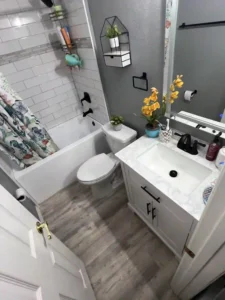
Image by Valentynsemenov on Canva
When it comes to improving your home, understanding the key differences between renovation vs remodel is essential. Both terms are often used interchangeably, but they entail distinct processes that can significantly impact your project’s scope, cost, and outcome. Whether you’re looking to refresh a tired space or completely transform your home’s layout, knowing what to expect from a renovation and a remodel will help you make informed decisions.
In this article, we’ll delve into the definitions, purposes, and benefits of both renovation and remodeling projects, providing you with a clear guide to choose the right approach for your home improvement needs.
What Is Renovation?
Renovation involves updating or repairing a structure to improve its appearance, functionality, or both without significantly altering its original design or layout. Common renovation projects include repainting walls, replacing flooring, updating fixtures, or installing new windows. The primary goal is to refresh and restore the space, maintaining its existing framework while enhancing its aesthetics and usability.
What Is a Remodel?
A remodel entails making substantial changes to a structure’s design and layout to transform its functionality and appearance. This process often includes altering floor plans, adding or removing walls, and installing new plumbing or electrical systems. The aim is to create a significantly different space that better suits the owner’s needs and preferences, often resulting in a completely new look and improved efficiency.
So, What’s the Difference Between Renovation vs Remodel?
There are several factors that differentiate renovation from remodel, each impacting the scope, cost, and outcome of a project. Understanding these distinctions is crucial for homeowners and contractors to ensure clarity and alignment of expectations.
Definition and Scope
Renovation involves restoring or updating a structure without significantly altering its original design and layout. Common renovations include painting, replacing fixtures, or upgrading flooring. In contrast, remodeling involves changing the structure’s layout, design, or function, such as removing walls to create an open floor plan or adding new rooms. Renovations refresh, while remodels transform.
Cost and Budget
Renovations typically cost less than remodels due to the scope of work involved. Renovating focuses on surface-level improvements and repairs, which usually require less labor and materials. Remodeling involves more complex tasks, such as structural changes, plumbing, and electrical work, leading to higher costs. Budgeting for a remodel often necessitates planning for unexpected expenses.
Time and Duration
The time required for a renovation is generally shorter than that for a remodel. Renovations focus on surface improvements and minor updates, which can be completed relatively quickly. Remodels involve extensive changes, including structural alterations, which require longer timelines due to the complexity of the tasks. Additionally, remodels may need permits and inspections, further extending the duration.
Purpose and Objective
The primary purpose of a renovation is to refresh and update the look and feel of a space without altering its overall structure. It aims to fix what is outdated or damaged, enhancing the property’s aesthetic and functionality. Remodeling, in contrast, aims to transform the space entirely, often changing its function and design to better suit the homeowner’s needs.
Impact on Home Value
Both renovations and remodels can increase a home’s value, but they do so in different ways. Renovations typically provide a higher return on investment for minor updates, as they improve the home’s appearance and condition without significant expense. Remodels, while more costly, can add substantial value by transforming and modernizing spaces, making the home more attractive to buyers.
Regulatory Requirements
Renovations usually require fewer permits and less regulatory oversight than remodels. Since renovations focus on updating existing features without major structural changes, the process is often simpler and quicker. Remodels, involving significant alterations to the structure, frequently require multiple permits, adherence to building codes, and inspections. This adds complexity and time to the project, requiring homeowners to navigate additional regulatory steps.
Frequently Asked Questions

How do I decide between a renovation vs remodel for my home?
When deciding between a renovation vs remodel, consider your budget, timeline, and the extent of changes you want. If you’re looking to refresh your home with minor updates, a renovation might be the best choice. However, if you need to alter the layout or functionality significantly, a remodel will better suit your needs.
What factors influence the cost of a renovation vs remodel?
The cost of a renovation vs remodel is influenced by the project’s scope, the materials used, and labor requirements. Renovations are typically less expensive because they focus on surface-level improvements, while remodels involve structural changes, which require more labor and higher-quality materials.
How can I minimize disruptions during a renovation or remodel?
To minimize disruptions, plan the project carefully and communicate with your contractor about your needs and schedule. Setting up a temporary living space in an unaffected area of the home, scheduling work during vacations or off-peak times, and discussing timelines and expectations with your contractor can help reduce the impact on your daily life.
How can I ensure my renovation or remodel stays on budget?
To stay on budget, start with a clear plan and detailed cost estimates. For renovations, focus on necessary updates and prioritize tasks. For remodels, account for unexpected expenses and allocate a contingency fund. Hiring a reputable contractor and maintaining regular communication throughout the project can also help manage costs effectively.
Conclusion
Understanding the differences between renovation vs remodel is crucial for making informed home improvement decisions. Renovations refresh and restore without altering the original layout, while remodels transform and significantly change the structure. By evaluating your needs, budget, and goals, you can choose the right approach for your project.
For expert guidance and quality work on your home improvement project, trust Miller 86, the best home improvement contractor in Winter Haven, FL. Contact us today to bring your vision to life!





